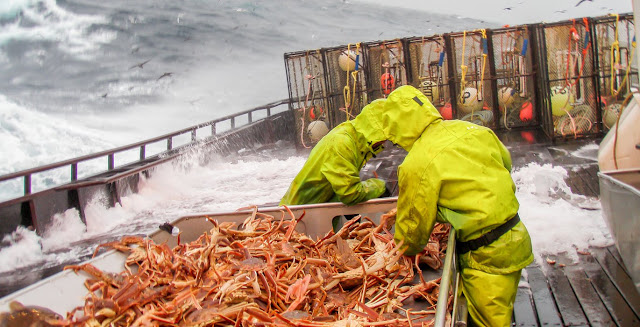Cracking the Debate: The Conflict over Snow Crab Harvesting
A legal fight is underway between Norway and a Latvian company over the snow crabs of the Arctic Archipelago. Norway’s Supreme Court is hearing a case on the issue of whether Latvian trawlers can catch snow crabs in the strategically significant Svalbard Archipelago in the Arctic.
Image Source: Wikipedia
Introduction
The Svalbard Archipelago, located in the Arctic Ocean, is home to a variety of unique and fascinating creatures. Among these, the snow crab stands out as a particularly intriguing species. Snow crabs, also known as Chionoecetes opilio, are a type of crab that can be found in the cold waters around the Svalbard islands. These crabs are well adapted to living in the harsh Arctic environment and have become an important part of the local ecosystem. With their distinctive appearance and interesting behaviors, snow crabs are a fascinating subject for researchers and nature enthusiasts alike. Even on the economic side, considered a type of ‘Arctic Gold’, these creatures hold great importance.
Background of Snow Crab Harvesting
The arrival of snow crabs in the Barents Sea is relatively new; observed first in 1996. As the name suggests, the natural habitat of snow crabs is the cold waters of the North Pacific, North-western Atlantic Ocean and the Barents Sea (Henriksen, 2020). Fishing for snow crabs happens all year round in the Barents Sea as well as the Svalbard zone. Most stock of the snow crab is found on the seabed under the Russian jurisdiction; however, it gradually migrated into the Norwegian jurisdiction in the waters located in the east of Svalbard, thereby beginning the commercial harvest of the species in 2013. Soon after, a snow crab fishery was heralded as ‘Arctic Gold’ due to its economic and commercial viability. Snow crabs are one of the most economically significant species of crab, forming an essential part of the commercial fishing industry. The potential valuation of snow crabs in Norwegian waters is estimated to be around USD 720 million (Henriksen, 2020). Thus, countries in the region such as Latvia and Poland expanded their operations in Norwegian waters.
Image Source: Arctic Focus
In 2019, a Latvian fishing company was refused a license for fishing snow crabs by Norway on the continental shelf around Svalbard. In the case regarding this refusal before the Norway Supreme Court, the Latvian firm is claiming the right to access Svalbard’s territorial waters under the Svalbard Treaty of 1920. This treaty grants Norway sovereignty over the Arctic islands with the condition that other signatories have equal rights to resources in Svalbard’s waters (Reuters, 2023). Norway has rejected this claim based on non-applicability of the treaty in the continental shelf within 200 nautical miles and that it is entitled to exercise its sovereign rights in the zone to exclude vessels of other States. This contention over the snow crabs adds another layer to the dispute concerning the continental shelf. According to Prof. Oeystein Jensen, the case has far-reaching implications in terms of the extent of the treaty. He argues, “if the Supreme Court thinks the Svalbard treaty applies, it is not only about snow crab; it will be about oil, gas, minerals and fish.” Climate change opens up new areas for resource exploitation, especially in the Arctic, which makes the region so attractive to other stakeholders (CNN, 2023). The key question then is how far these rights extend in terms of accessing the ocean.
The contention over snow crabs illustrates the convoluted nature of governance of the marine environment of the Arctic. Management of marine resources will further become complicated with questions regarding geographical applicability of the Svalbard Treaty remaining largely contentious (Henriksen, 2020). Furthermore, the presence of snow crabs in the area is relatively new; therefore, uncertainty regarding its effect on the ecosystem and marine biodiversity persists (The Conversation, 2018). The stakes are higher than just profits from snow crabs since it involves broader questions about how climate change is affecting the economies of these regions (ibid). This impasse not only encompasses issues with respect to maritime zones but also has far-reaching environmental and societal consequences.
References
CNN (2023). ‘A
ginormous can of worms’: How a fight over snow crabs could lead to a win for
oil drilling access https://edition.cnn.com/2023/01/27/world/snow-crabs-oil-norway-svalbard-climate-intl/index.html
Henriksen, T. (2020). Snow Crab in the Barents Sea:
Managing a Non-native Species in Disputed Waters. Arctic Review on Law and
Politics, 11, 108–132. https://doi.org/10.23865/arctic.v11.2545
HIGH NORTH NEWS (2018). Crabtacular! Snow crabs on their march from Svalbard
to Brussels https://www.highnorthnews.com/nb/op-ed-crabtacular-snow-crabs-their-march-svalbard-brussels
Reuters (2023). Norway's Supreme Court hears Arctic snow crab case affecting oil,
minerals https://www.reuters.com/world/europe/norways-supreme-court-hear-arctic-snow-crab-case-affecting-oil-minerals-2023-01-24/c
The Conversation (2018). Snow Crabs and the Complexities of Climate Change https://theconversation.com/snow-crab-saga-a-story-that-demonstrates-the-complexities-of-climate-change-93092




Comments
Post a Comment